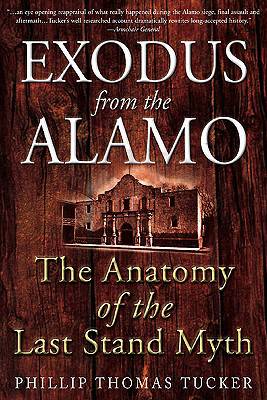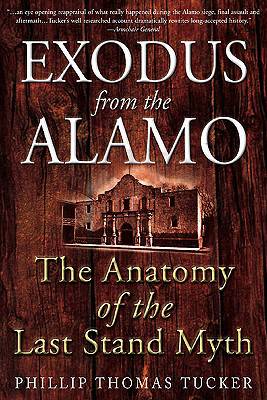
- Retrait gratuit dans votre magasin Club
- 7.000.000 titres dans notre catalogue
- Payer en toute sécurité
- Toujours un magasin près de chez vous
- Retrait gratuit dans votre magasin Club
- 7.000.000 titres dans notre catalogue
- Payer en toute sécurité
- Toujours un magasin près de chez vous
Exodus from the Alamo
The Anatomy of the Last Stand Myth
Phillip Thomas Tucker
Livre broché | Anglais
34,95 €
+ 69 points
Description
A Selection of the Military and History Book Clubs A startling new analysis of one of America's most glorious battles . . . Contrary to movie and legend, we now know that the defenders of the Alamo in the war for Texan independence--including Davy Crockett, Jim Bowie and William B. Travis--did not die under brilliant sunlight, defending their positions against hordes of Mexican infantry. Instead the Mexicans launched a predawn attack, surmounting the walls in darkness, forcing a wild melee inside the fort before many of its defenders had even awoken. In this book, Dr. Tucker, after deep research into recently discovered Mexican accounts and the forensic evidence, informs us that the traditional myth of the Alamo is even more off-base: most of the Alamo's defenders died in breakouts from the fort, cut down by Santa Anna's cavalry that had been pre-positioned to intercept the escapees. To be clear, a number of the Alamo's defenders hung on inside the fort, fighting back every way they could. Captain Dickinson, with cannon atop the chapel (in which his wife hid), fired repeatedly into the Mexican throng of enemy cavalry until he was finally cut down. The controversy on Crockett still remains, though the recently authenticated diary of the Mexican de la Pena offers evidence that he surrendered. The most startling aspect of this book is that most of the Texans, in two gallantly led groups, broke out of the fort after the enemy had broken in, and the primary fights took place on the plain outside. Still fighting desperately, the Texans' retreat was halted by cavalry, and afterward Mexican lancers plied their trade with bloodcurdling charges into the midst of the remaining resisters. Notoriously, Santa Anna burned the bodies of the Texans who had dared stand against him. As this book proves in thorough detail, the funeral pyres were well outside the fort--that is, where the two separate groups of escapers fell on the plain, rather than in the Alamo itself. PHILLIP THOMAS TUCKER earned his Ph.D. in American History from St. Louis University in 1990. The author or editor of more than 20 books on military history, several of which have won national and state awards for scholarship, he has worked as a U.S. Air Force Historian for nearly two decades in Washington, DC.
Spécifications
Parties prenantes
- Auteur(s) :
- Editeur:
Contenu
- Nombre de pages :
- 432
- Langue:
- Anglais
Caractéristiques
- EAN:
- 9781612000763
- Date de parution :
- 26-09-11
- Format:
- Livre broché
- Format numérique:
- Trade paperback (VS)
- Dimensions :
- 153 mm x 227 mm
- Poids :
- 693 g







